外研版选修六Module 5 Cloning Listening and vocabulary & Everyday English 课件(共52张PPT)
文档属性
| 名称 | 外研版选修六Module 5 Cloning Listening and vocabulary & Everyday English 课件(共52张PPT) |
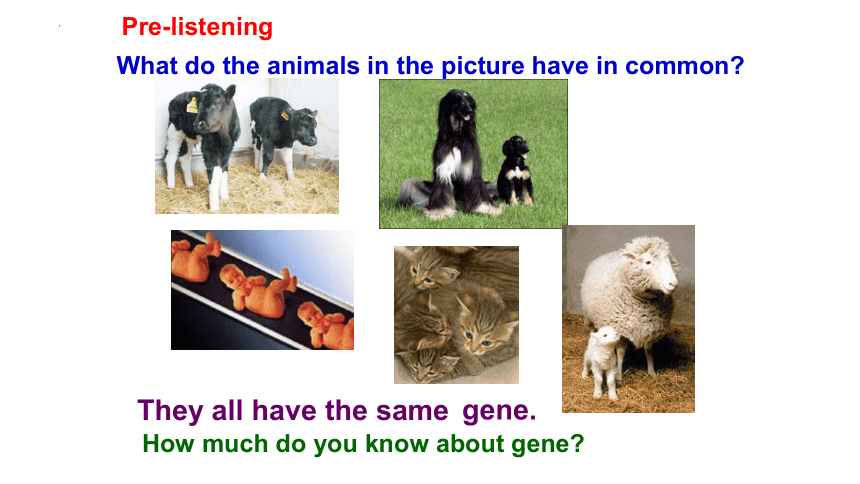
|
|
| 格式 | pptx | ||
| 文件大小 | 2.7MB | ||
| 资源类型 | 教案 | ||
| 版本资源 | 外研版 | ||
| 科目 | 英语 | ||
| 更新时间 | 2022-12-09 21:13:54 | ||
图片预览


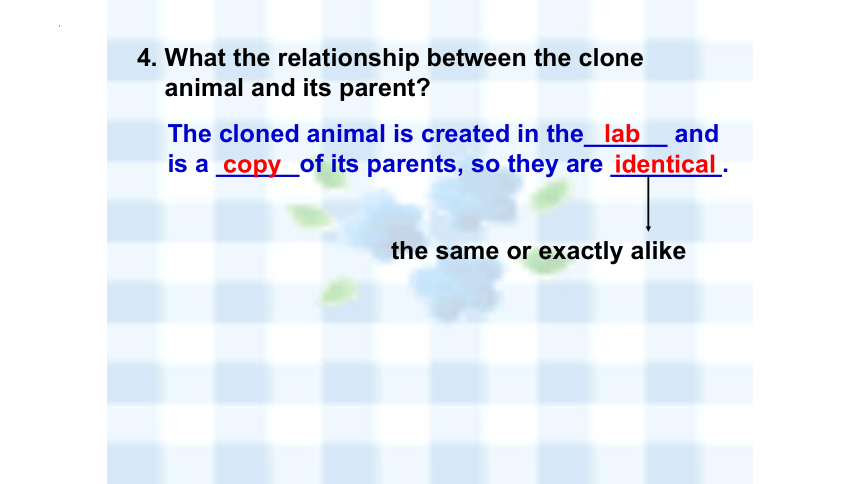
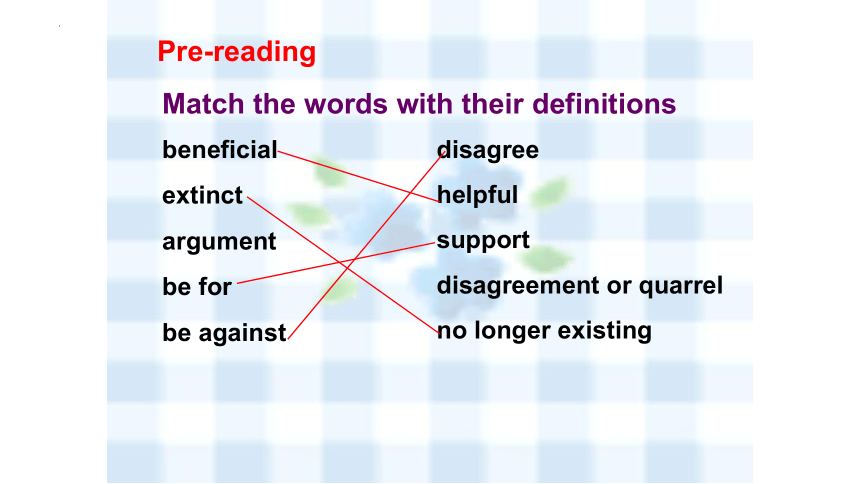
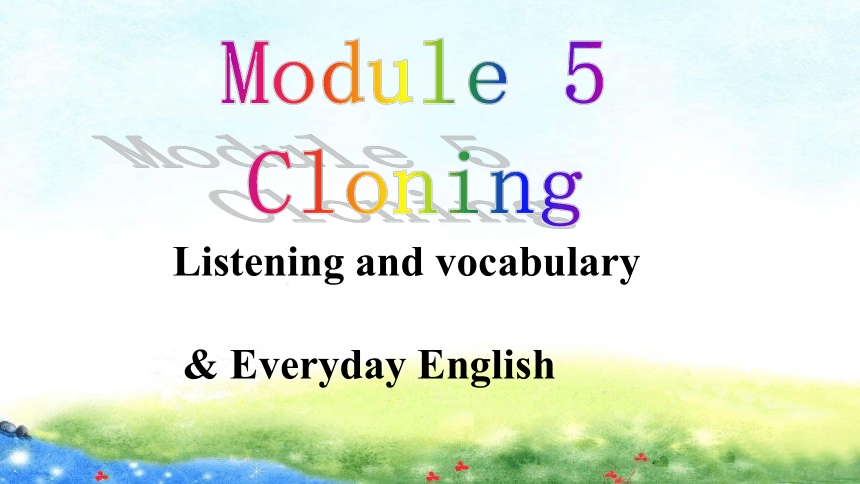
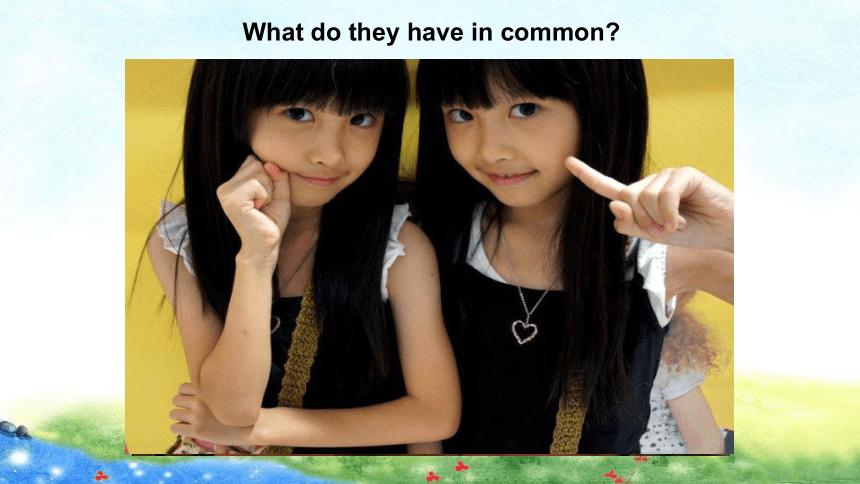
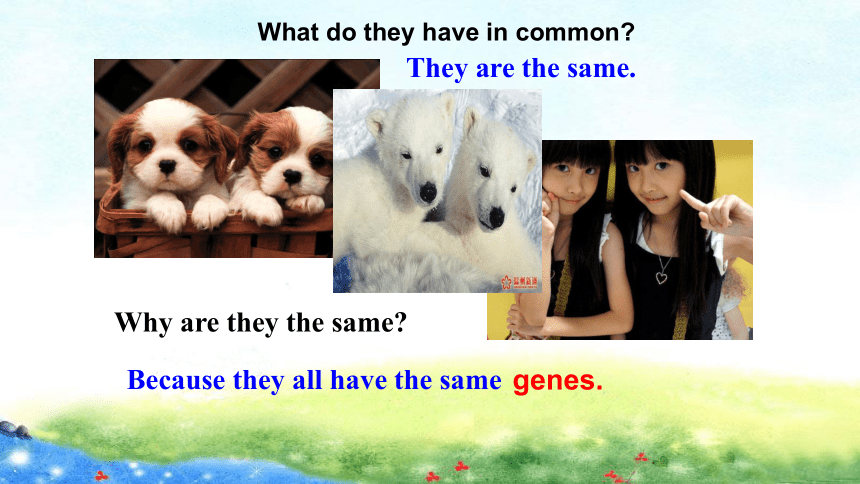

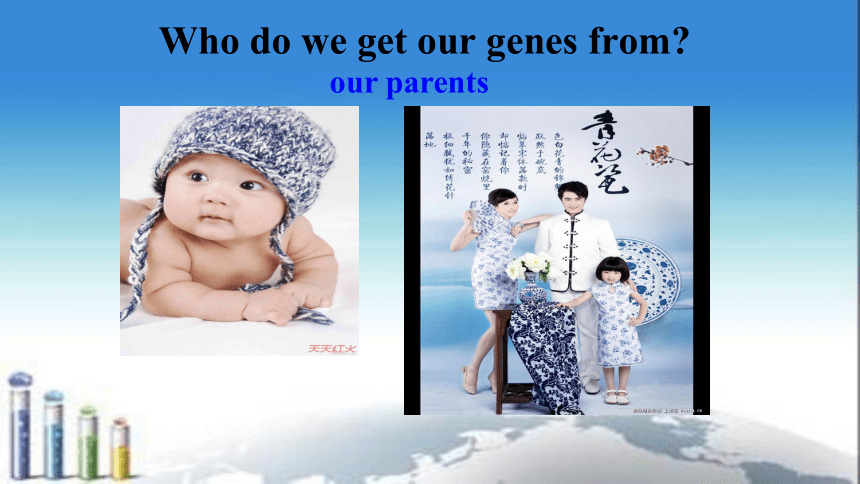
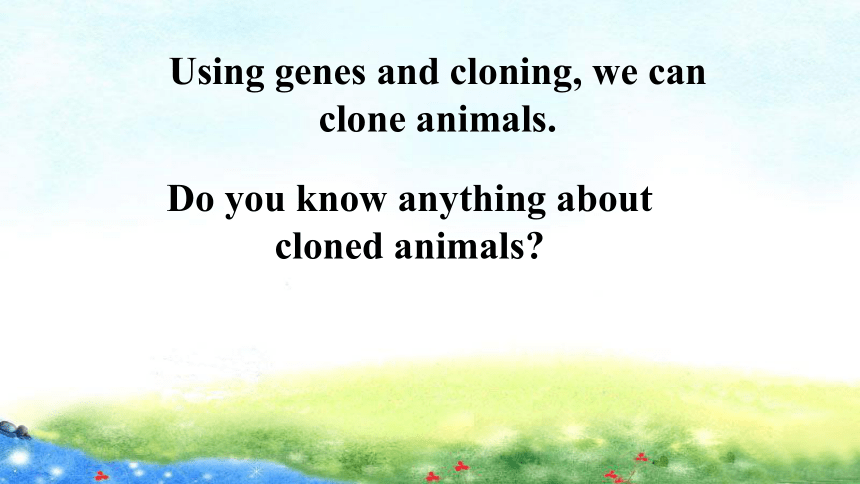
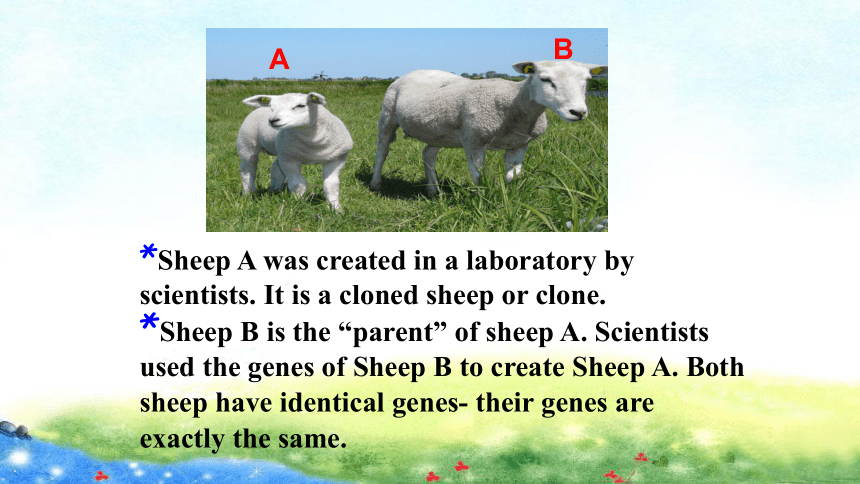

文档简介
(共52张PPT)
What do the animals in the picture have in common
They all have the same
gene.
How much do you know about gene
Pre-listening
1. Who do we get our genes from
2. Who do cloned animals get their genes from
3. Are the parents in two sentences the same Why
We get our genes from our parents.
They get their genes from their parents.
No, they are not the same.
The first parents consist of a male and female,
while the second parents consist of only a male
or female.
4. What the relationship between the clone
animal and its parent
The cloned animal is created in the______ and is a ______of its parents, so they are ________.
copy
identical
the same or exactly alike
lab
beneficial
extinct
argument
be for
be against
disagree
helpful
support
disagreement or quarrel
no longer existing
Pre-reading
Match the words with their definitions
Module 5
Cloning
Listening and vocabulary
& Everyday English
What do they have in common
What do they have in common
Because they all have the same
genes.
Why are they the same
They are the same.
a gene---the part of a cell that controls how it develops
What is a gene
Who do we get our genes from
our parents
Do you know anything about cloned animals
Using genes and cloning, we can clone animals.
B
A
*Sheep A was created in a laboratory by scientists. It is a cloned sheep or clone.
*Sheep B is the “parent” of sheep A. Scientists used the genes of Sheep B to create Sheep A. Both sheep have identical genes- their genes are exactly the same.
Where are cloned animals created
What is the relationship between sheep A and Sheep B
Why are Sheep A and Sheep B the same
In a laboratory.
Sheep B is the “parent” of sheep A.
Because both sheep have identical genes.
Their genes are exactly the same.
As for cloning, some people are _______ cloning, while others are ________ cloning.
So there is an argument.
for
against
Do you think that cloning is a good idea or a bad idea
Pre-listening
P61 activity 3
Say which of the arguments below are for cloning and which are against cloning.
Write F (for) A (against)
Cloning is against nature._______.
Cloning will be beneficial to humans. For example, if a couple can’t have children, cloning could help give them a child.____
Cloned animals get ill and die quite young.___
People are afraid that scientists will create thousands of copies of the same person.___
Cloning is dangerous because scientists may create monsters by mistake.____
We could use cloning to cure illness._____
A
F
A
A
A
F
There are four sentences in listening. Listen and find them out. Activity 3 on page 61
Cloning is against nature._______.
Cloning will be beneficial to humans. For example, if a couple can’t have children, cloning could help give them a child.____
Cloned animals get ill and die quite young.___
People are afraid that scientists will create thousands of copies of the same person.___
Cloning is dangerous because scientists may create monsters by mistake.____
We could use cloning to cure illness._____
A
F
A
A
A
F
While-listening
The presenter Dr. Donaville
For cloning
1. Cloning will _________humans.
A. be beneficial to B. be bad for
2.Cloning is a way of _________.
A. helping nature B. against nature
3. A clone can never be _______ copy of another person.
A. a similar B. an identical
4. We could clone animals that _________.
A. have become extinct
B. are becoming extinct
Careful-listening
Against cloning
1. Cloned animals ___ ____and _____quite young.
2. Cloning is _______and _______ nature.
3. ________ thinks Cloning treats animals and people as things, as products.
A. The presenter B. Dr. Donaville
4. Donaville thinks it is _______ to create thousands of copies of the same person.
A. a good idea B. terrible
against
wrong
get ill
die
Dr Hugh Donaville is for cloning. Many people are against cloning.
cloning
Cloning will be beneficial to humans.
Cloning is a way of helping nature.
A clone can never be an identical copy of another person.
We could clone animals that are becoming extinct.
Cloned animals get ill and die quite young.
Cloning is wrong and against nature.
Cloning treats animals and people as things, as products.
It is terrible to create thousands of copies of the same person.
Firstly,
Secondly,
Thirdly,
Finally,
Are you for or against cloning
Are you for or against cloning
I am for cloning.
Because________________________.
I am against cloning.
Because ____________________.
It’s show time.
speaking
In this listening passage , there are some very important expressions helping us continue our talk with others.
Listen and fill in the blanks with the following expressions.
on the contrary That’s it.
Incredible! to continue
obviously in other words
Nonsense!
Everyday English
Presenter: Why do they get ill
Huge D: We’ve got a few ideas but we don’t really understand why yet.
Presenter: I see. Now __________Dr Donaville, you believe that cloning will be beneficial to human beings.
obviously
1)
Presenter: But cloning treats animals and people as things, as products.
Huge D:___________! I don’t think that’s true at all. I don’t think scientists treated Dolly the sheep as a product. She was a sheep!
Nonsense!
2)
Presenter: I’m glad you agree about that. But why do scientists want to clone humans I can’t see any good reasons for this.
Huge D: ________________.there are very good reasons. For example, if a couple can’t have children, then cloning can give them a child. And if a child dies, we could clone it.
On the contrary
3)
Presenter: Create an identical copy, you mean I think that’s a terrible idea.
Huge D: A clone can never be an identical copy of another person. It’s not just your genes that create who you are. It’s your family and society as well.
Presenter: True.
Hugh D: ______________, we could clone animals that are becoming extinct.
Presenter: Yes, if we were able to do that, it would be wonderful. I can see there are many arguments both for and against cloning.
To continue
4)
Activity 1 on page 63
Now match the expressions in the box with their meanings.
1. clearly
2. I’m going to continue.
3. to say it another way
4. It’s difficult to believe!
5. The opposite is true.
6. That’s completely untrue.
7. That’s right.
1
3
2
4
5
6
7
on the contrary That’s it. Incredible! to continue obviously
in other words Nonsense!
2. Complete the conversation with the expressions. on the contrary That’s it. Incredible! to continue obviously in other words Nonsense!
T(Teacher): Tell me what you know about cloning.
S(Student): Cloned animals take their genes from both their parents.
T: _______________they take their genes from a single parent.
On the contrary
S: Sorry, yes. __________ scientists join an egg and an adult cell from the same animal or plant. This creates a clone.
T: ________! Well done!
S: But of course, cloned animals will never be “real” animals, will they
To continue
That’s it
T: _________! _________, there are problems with cloned animals at the moment. This is because cloning is a new science. But one day, clones will be just as good as real animals or humans.
S: _____________, cloned animals will be just like you or me
T: Yes!
S: _________!
Nonsense
Obviously
In other words
Incredible
Homework
Write down your own ideas about the cloning.
Thank you!
1. Dr Hugh Donaville works for a company that has already cloned a number of people.
2. A sheep called Dolly was cloned in 1998.
animals
1997
Correct the wrong information in these sentences according to the listening material.
3. Dolly the sheep died in 2003.
4. Donaville thinks scientists treated Dolly the sheep as a product.
The professor
5. Donaville says that if a child is very ill, scientists could clone it.
6. Donaville thinks it’s a good idea to have thousands of copies of the same person.
7. Donaville says that we could clone animals that have become extinct.
dies
terrible
are becoming extinct
Listen to the passage.
Listen and fill in the missing words.
Presenter: Our topic for this week is
______. To discuss it, we have with us Dr
Hugh Donaville, head of a company that
has already cloned __ _______ __ animals.
Hugh D: Good morning.
Presenter: Dr Donaville, could you begin
with __ ______ __________ of cloning
Hugh D: Certainly. Cloned animals are
created in a laboratory. They take all
their genes from __ ______ ______.
a single parent
cloning
a number of
a simple explanation
Presenter: So cloned animals come from one parent only.
Hugh D: Precisely.
Presenter: _____ _________ has cloning
been so far
Hugh D: Well, as most people know, in 1997 scientists cloned __ _____ called Dolly. Since then, scientists have cloned animals such as ____ and ____.
How successful
a sheep
cats
pigs
Presenter: You make cloning sound easy.
Hugh D: Do I I wish it was. If it was
easy, I'd be a very rich man by now.
Presenter: So what are the _________
Hugh D: Unfortunately, cloned animals
get ill and die _____ ______. For example, Dolly the sheep died in 2003. She should have lived longer.
Presenter: _____ do they get ill
Hugh D: We’ve got a few ideas but we
don’t _____ __________ why yet.
quite young
difficulties
Why
really understand
Presenter: I see. Now obviously, Dr.
Donaville, you believe that cloning will be
_________ to human beings.
Hugh D: Yes, I do. If I _____ _______ that,
I’d be in a different job.
Presenter: Many people believe
that cloning is ______ ___ ______ _______.
How do you answer them
beneficial
wrong and against nature
didn’t believe
Hugh D: I tell them that cloning is a way
of ______ ______.
Presenter: But cloning treats animals and
people as things, as ________.
Hugh D: ________! I don't think that's
true at all. I don't think scientists treated
Dolly the sheep as a product. She was a
sheep!
Nonsense
helping nature
products
Presenter: I'm not sure everyone believes that. Also, people ____ _____ ____ scientists will create thousands of copies
of the same person.
Hugh D: I agree, if that happened, it would be terrible. We ____ ____ to prevent that.
Presenter: I'm glad you agree about that. But why do scientists want to clone humans I can't see ____ ____ _______ for this.
are afraid that
need laws
any good reasons
Hugh D: ___ ____ _______, there are very good reasons. For example, if a couple _____ ____ _______, then cloning can give them a child. And if a child dies, we could clone it.
Presenter: Create an identical copy, you mean I think that's a _______ ____.
Hugh D: A clone can never be an identical copy of another person. It's not just your genes that create who you are. It's your family and society ___ ____.
On the contrary
can't have children
terrible idea
as well
Presenter: True.
Hugh D: ___ _______, we could clone animals that are becoming extinct.
Presenter: Yes, if we were able to do that, it would be wonderful. I can see there are _____ _________ both for and against cloning.
To continue
many arguments
For cloning Against cloning
Cloning will be ___________to humans. If a _______ can’t have children, cloning can help them. Cloned animals _______ _____ and die quite _________ but scientists still can’t tell why.
Cloning is a way of _________ nature. Cloning ________is and _________nature.
A clone can never be an ________ copy, your genes, ________ and ________ work together create who you are. Cloning treats animals and people as_______, as_________
We could clone animals that are __________ ___________ Scientists will create thousands of ________ of the same person.
beneficial
helping
couple
identical
family
society
extinct
becoming
get ill
young
wrong
against
things
products
copies
consolidation
Match these words and expressions in the box with their meanings.
Everyday English
on the contrary
That’s it.
Incredible
to continue
obviously
in other words
Nonsense!
clearly
I’m going to continue.
to say it another way
It’s a difficult to believe!
The opposite is true.
That’s completely untrue.
That’s right.
Complete the conversation with the expressions.
T(Teacher): Tell me what you know about cloning.
S(Student): Cloned animals take their genes from both their parents.
T: ______________, they take their genes from a single parent.
On the contrary
S: Sorry, yes. __________ scientists join an egg and an adult cell from the same animal or plant. This creates a clone.
T: ________! Well done!
S: But of course, cloned animals will never be “real” animals, will they
To continue
That’s it
T: _________! _________, there are problems with cloned animals at the moment. This is because cloning is a new science. But one day, clones will be just as good as real animals or humans.
S: _____________, cloned animals will be just like you or me
T: Yes!
S: _________!
Nonsense
Obviously
In other words
Incredible
Language points
1. have arguments with sb. about sth. 因为某事和某人发生争论
相当于: argue with sb. about sth.
3. by mistake 错误地
make a mistake 犯错误
mistake A for B 误把A 当成B
【活学活用】
(1)—I am sorry to have taken your umbrella____________.
—That's all right.
“我很抱歉错拿了你的伞。” “没关系。”
(2) She __________________for her twin sister.
她常被误认为是她的孪生姐姐/妹妹。
by mistake
is often mistaken
What do the animals in the picture have in common
They all have the same
gene.
How much do you know about gene
Pre-listening
1. Who do we get our genes from
2. Who do cloned animals get their genes from
3. Are the parents in two sentences the same Why
We get our genes from our parents.
They get their genes from their parents.
No, they are not the same.
The first parents consist of a male and female,
while the second parents consist of only a male
or female.
4. What the relationship between the clone
animal and its parent
The cloned animal is created in the______ and is a ______of its parents, so they are ________.
copy
identical
the same or exactly alike
lab
beneficial
extinct
argument
be for
be against
disagree
helpful
support
disagreement or quarrel
no longer existing
Pre-reading
Match the words with their definitions
Module 5
Cloning
Listening and vocabulary
& Everyday English
What do they have in common
What do they have in common
Because they all have the same
genes.
Why are they the same
They are the same.
a gene---the part of a cell that controls how it develops
What is a gene
Who do we get our genes from
our parents
Do you know anything about cloned animals
Using genes and cloning, we can clone animals.
B
A
*Sheep A was created in a laboratory by scientists. It is a cloned sheep or clone.
*Sheep B is the “parent” of sheep A. Scientists used the genes of Sheep B to create Sheep A. Both sheep have identical genes- their genes are exactly the same.
Where are cloned animals created
What is the relationship between sheep A and Sheep B
Why are Sheep A and Sheep B the same
In a laboratory.
Sheep B is the “parent” of sheep A.
Because both sheep have identical genes.
Their genes are exactly the same.
As for cloning, some people are _______ cloning, while others are ________ cloning.
So there is an argument.
for
against
Do you think that cloning is a good idea or a bad idea
Pre-listening
P61 activity 3
Say which of the arguments below are for cloning and which are against cloning.
Write F (for) A (against)
Cloning is against nature._______.
Cloning will be beneficial to humans. For example, if a couple can’t have children, cloning could help give them a child.____
Cloned animals get ill and die quite young.___
People are afraid that scientists will create thousands of copies of the same person.___
Cloning is dangerous because scientists may create monsters by mistake.____
We could use cloning to cure illness._____
A
F
A
A
A
F
There are four sentences in listening. Listen and find them out. Activity 3 on page 61
Cloning is against nature._______.
Cloning will be beneficial to humans. For example, if a couple can’t have children, cloning could help give them a child.____
Cloned animals get ill and die quite young.___
People are afraid that scientists will create thousands of copies of the same person.___
Cloning is dangerous because scientists may create monsters by mistake.____
We could use cloning to cure illness._____
A
F
A
A
A
F
While-listening
The presenter Dr. Donaville
For cloning
1. Cloning will _________humans.
A. be beneficial to B. be bad for
2.Cloning is a way of _________.
A. helping nature B. against nature
3. A clone can never be _______ copy of another person.
A. a similar B. an identical
4. We could clone animals that _________.
A. have become extinct
B. are becoming extinct
Careful-listening
Against cloning
1. Cloned animals ___ ____and _____quite young.
2. Cloning is _______and _______ nature.
3. ________ thinks Cloning treats animals and people as things, as products.
A. The presenter B. Dr. Donaville
4. Donaville thinks it is _______ to create thousands of copies of the same person.
A. a good idea B. terrible
against
wrong
get ill
die
Dr Hugh Donaville is for cloning. Many people are against cloning.
cloning
Cloning will be beneficial to humans.
Cloning is a way of helping nature.
A clone can never be an identical copy of another person.
We could clone animals that are becoming extinct.
Cloned animals get ill and die quite young.
Cloning is wrong and against nature.
Cloning treats animals and people as things, as products.
It is terrible to create thousands of copies of the same person.
Firstly,
Secondly,
Thirdly,
Finally,
Are you for or against cloning
Are you for or against cloning
I am for cloning.
Because________________________.
I am against cloning.
Because ____________________.
It’s show time.
speaking
In this listening passage , there are some very important expressions helping us continue our talk with others.
Listen and fill in the blanks with the following expressions.
on the contrary That’s it.
Incredible! to continue
obviously in other words
Nonsense!
Everyday English
Presenter: Why do they get ill
Huge D: We’ve got a few ideas but we don’t really understand why yet.
Presenter: I see. Now __________Dr Donaville, you believe that cloning will be beneficial to human beings.
obviously
1)
Presenter: But cloning treats animals and people as things, as products.
Huge D:___________! I don’t think that’s true at all. I don’t think scientists treated Dolly the sheep as a product. She was a sheep!
Nonsense!
2)
Presenter: I’m glad you agree about that. But why do scientists want to clone humans I can’t see any good reasons for this.
Huge D: ________________.there are very good reasons. For example, if a couple can’t have children, then cloning can give them a child. And if a child dies, we could clone it.
On the contrary
3)
Presenter: Create an identical copy, you mean I think that’s a terrible idea.
Huge D: A clone can never be an identical copy of another person. It’s not just your genes that create who you are. It’s your family and society as well.
Presenter: True.
Hugh D: ______________, we could clone animals that are becoming extinct.
Presenter: Yes, if we were able to do that, it would be wonderful. I can see there are many arguments both for and against cloning.
To continue
4)
Activity 1 on page 63
Now match the expressions in the box with their meanings.
1. clearly
2. I’m going to continue.
3. to say it another way
4. It’s difficult to believe!
5. The opposite is true.
6. That’s completely untrue.
7. That’s right.
1
3
2
4
5
6
7
on the contrary That’s it. Incredible! to continue obviously
in other words Nonsense!
2. Complete the conversation with the expressions. on the contrary That’s it. Incredible! to continue obviously in other words Nonsense!
T(Teacher): Tell me what you know about cloning.
S(Student): Cloned animals take their genes from both their parents.
T: _______________they take their genes from a single parent.
On the contrary
S: Sorry, yes. __________ scientists join an egg and an adult cell from the same animal or plant. This creates a clone.
T: ________! Well done!
S: But of course, cloned animals will never be “real” animals, will they
To continue
That’s it
T: _________! _________, there are problems with cloned animals at the moment. This is because cloning is a new science. But one day, clones will be just as good as real animals or humans.
S: _____________, cloned animals will be just like you or me
T: Yes!
S: _________!
Nonsense
Obviously
In other words
Incredible
Homework
Write down your own ideas about the cloning.
Thank you!
1. Dr Hugh Donaville works for a company that has already cloned a number of people.
2. A sheep called Dolly was cloned in 1998.
animals
1997
Correct the wrong information in these sentences according to the listening material.
3. Dolly the sheep died in 2003.
4. Donaville thinks scientists treated Dolly the sheep as a product.
The professor
5. Donaville says that if a child is very ill, scientists could clone it.
6. Donaville thinks it’s a good idea to have thousands of copies of the same person.
7. Donaville says that we could clone animals that have become extinct.
dies
terrible
are becoming extinct
Listen to the passage.
Listen and fill in the missing words.
Presenter: Our topic for this week is
______. To discuss it, we have with us Dr
Hugh Donaville, head of a company that
has already cloned __ _______ __ animals.
Hugh D: Good morning.
Presenter: Dr Donaville, could you begin
with __ ______ __________ of cloning
Hugh D: Certainly. Cloned animals are
created in a laboratory. They take all
their genes from __ ______ ______.
a single parent
cloning
a number of
a simple explanation
Presenter: So cloned animals come from one parent only.
Hugh D: Precisely.
Presenter: _____ _________ has cloning
been so far
Hugh D: Well, as most people know, in 1997 scientists cloned __ _____ called Dolly. Since then, scientists have cloned animals such as ____ and ____.
How successful
a sheep
cats
pigs
Presenter: You make cloning sound easy.
Hugh D: Do I I wish it was. If it was
easy, I'd be a very rich man by now.
Presenter: So what are the _________
Hugh D: Unfortunately, cloned animals
get ill and die _____ ______. For example, Dolly the sheep died in 2003. She should have lived longer.
Presenter: _____ do they get ill
Hugh D: We’ve got a few ideas but we
don’t _____ __________ why yet.
quite young
difficulties
Why
really understand
Presenter: I see. Now obviously, Dr.
Donaville, you believe that cloning will be
_________ to human beings.
Hugh D: Yes, I do. If I _____ _______ that,
I’d be in a different job.
Presenter: Many people believe
that cloning is ______ ___ ______ _______.
How do you answer them
beneficial
wrong and against nature
didn’t believe
Hugh D: I tell them that cloning is a way
of ______ ______.
Presenter: But cloning treats animals and
people as things, as ________.
Hugh D: ________! I don't think that's
true at all. I don't think scientists treated
Dolly the sheep as a product. She was a
sheep!
Nonsense
helping nature
products
Presenter: I'm not sure everyone believes that. Also, people ____ _____ ____ scientists will create thousands of copies
of the same person.
Hugh D: I agree, if that happened, it would be terrible. We ____ ____ to prevent that.
Presenter: I'm glad you agree about that. But why do scientists want to clone humans I can't see ____ ____ _______ for this.
are afraid that
need laws
any good reasons
Hugh D: ___ ____ _______, there are very good reasons. For example, if a couple _____ ____ _______, then cloning can give them a child. And if a child dies, we could clone it.
Presenter: Create an identical copy, you mean I think that's a _______ ____.
Hugh D: A clone can never be an identical copy of another person. It's not just your genes that create who you are. It's your family and society ___ ____.
On the contrary
can't have children
terrible idea
as well
Presenter: True.
Hugh D: ___ _______, we could clone animals that are becoming extinct.
Presenter: Yes, if we were able to do that, it would be wonderful. I can see there are _____ _________ both for and against cloning.
To continue
many arguments
For cloning Against cloning
Cloning will be ___________to humans. If a _______ can’t have children, cloning can help them. Cloned animals _______ _____ and die quite _________ but scientists still can’t tell why.
Cloning is a way of _________ nature. Cloning ________is and _________nature.
A clone can never be an ________ copy, your genes, ________ and ________ work together create who you are. Cloning treats animals and people as_______, as_________
We could clone animals that are __________ ___________ Scientists will create thousands of ________ of the same person.
beneficial
helping
couple
identical
family
society
extinct
becoming
get ill
young
wrong
against
things
products
copies
consolidation
Match these words and expressions in the box with their meanings.
Everyday English
on the contrary
That’s it.
Incredible
to continue
obviously
in other words
Nonsense!
clearly
I’m going to continue.
to say it another way
It’s a difficult to believe!
The opposite is true.
That’s completely untrue.
That’s right.
Complete the conversation with the expressions.
T(Teacher): Tell me what you know about cloning.
S(Student): Cloned animals take their genes from both their parents.
T: ______________, they take their genes from a single parent.
On the contrary
S: Sorry, yes. __________ scientists join an egg and an adult cell from the same animal or plant. This creates a clone.
T: ________! Well done!
S: But of course, cloned animals will never be “real” animals, will they
To continue
That’s it
T: _________! _________, there are problems with cloned animals at the moment. This is because cloning is a new science. But one day, clones will be just as good as real animals or humans.
S: _____________, cloned animals will be just like you or me
T: Yes!
S: _________!
Nonsense
Obviously
In other words
Incredible
Language points
1. have arguments with sb. about sth. 因为某事和某人发生争论
相当于: argue with sb. about sth.
3. by mistake 错误地
make a mistake 犯错误
mistake A for B 误把A 当成B
【活学活用】
(1)—I am sorry to have taken your umbrella____________.
—That's all right.
“我很抱歉错拿了你的伞。” “没关系。”
(2) She __________________for her twin sister.
她常被误认为是她的孪生姐姐/妹妹。
by mistake
is often mistaken
